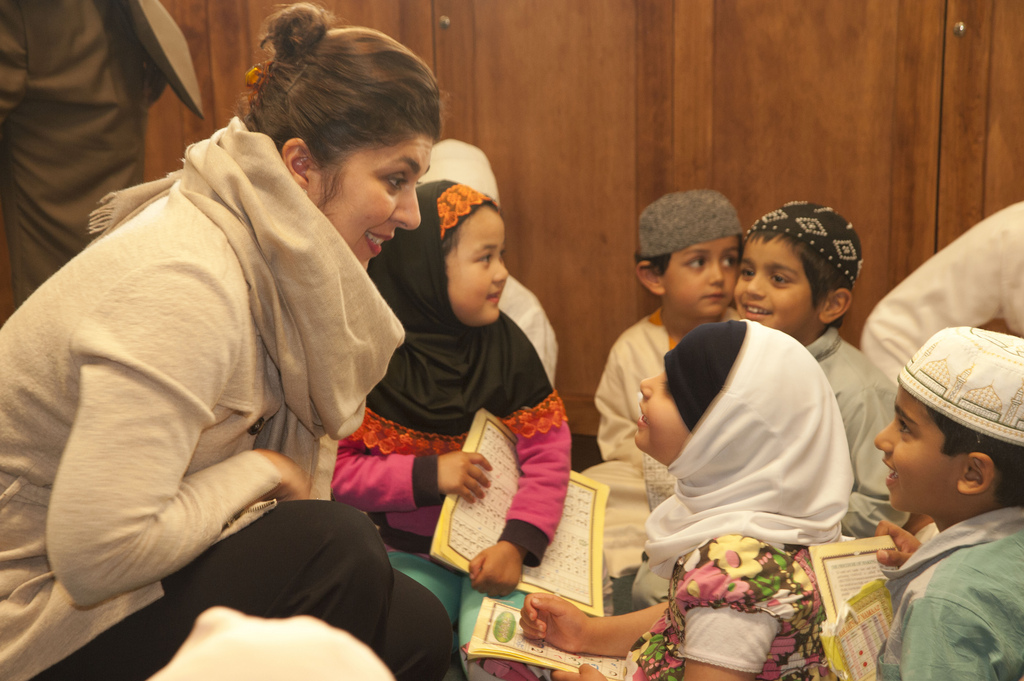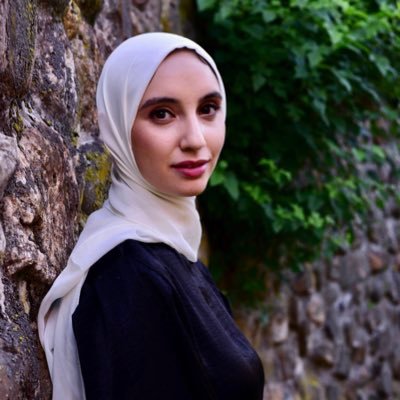“One of the things that troubles me greatly, not just for women but for youth as well, is that they don’t have the kind of alternative narratives available to them online that offer them that a diversity of thought on particular issues. I’m not talking about the typical conversations… but to talk about the choices you make and why you make them and how you live them. It seems from the questions you’re asking that Altmuslimah is concerned with how Muslim women can lead.”
This is the second part of a two-part interview with Farah Pandith. For part one, click here.
![]() Which of the challenges you face in your job are unique to your being a woman?
Which of the challenges you face in your job are unique to your being a woman?
Farah Pandith: When you are a seasoned professional and have a body of work behind you and a solid reputation, then you are not seen as woman or man of South Asian descent. I had a powerful role model in my mother who was from a culture that had very traditional role models for what women do with their professions and she broke out of that to become a doctor. I also attended an all-women’s college where leadership and being active and engaged in your community as a female was central to the way in which I lived my life.
![]() As a Muslim female who serves as a representative of this country to Muslim communities across the world and vice versa, how do you manage personal criticisms regarding modesty?
As a Muslim female who serves as a representative of this country to Muslim communities across the world and vice versa, how do you manage personal criticisms regarding modesty?
You have to be respectful and culturally sensitive, but you also have to be true to yourself. I am an American and I was raised in this country. I learned about Islam in America. Being an American diplomat, I am somebody who has had the privilege of traveling to dozens of countries around the world, and I understand very well the societal norms that you must adhere to. Modesty is an important piece of that; there are places you go where you must be more modestly dressed than others. The choice of covering my hair is a personal choice. When I am in a mosque, of course I cover my hair as that is fundamental to the way in which you pray, but I have found that I have had very dignified, respectable meetings in which I am in Western dress. I’ve always been treated with respect. I’ve always been listened to. I’ve always had the capacity to engage in good conversation. If you are transparent in terms of what you are trying to achieve, it is simply a human to human interaction. Sometimes I will plan separate meetings with women and girls, and separate meetings with men. It creates a more comfortable environment and you hear different things come out of the two types of gatherings.
![]() What advice do you have for Muslim Americans on how to deal with questions regarding gender relations and sexuality?
What advice do you have for Muslim Americans on how to deal with questions regarding gender relations and sexuality?
You’re putting your finger on a very important issue that is happening globally: how you navigate being both modern and Muslim. I think you honor the traditions that are important for your family and your faith. There’s no one-size-fits-all. Something that’s a tradition for me may be very different from your family norm. I grew up in Massachusetts and was the only Muslim student in my school. I grew up very integrated; the Western values and Islam [were] handled side-by-side. I saw no difference between being Muslim and being Western. There’s a way to find a balance in your identity that makes sense for you and the way you were brought up. So I don’t have the right to comment on how anybody should live. Because Islam is made up of more than eighty different ethnicities in America, there is not one monolith approach that all Muslims must use.
Issues of personal choice are really important as well. One of the things that troubles me greatly, not just for women but for youth as well, is that they don’t have the kind of alternative narratives available to them online that offer them that a diversity of thought on particular issues. I’m not talking about the typical conversations of hijab versus non-hijab, do you drink, do you not drink, do you date, do you not date – that happens all the time – but to talk about the choices you make and why you make them and how you live them. It seems from the questions you’re asking that Altmuslimah is concerned with how Muslim women can lead. And I would love to inspire other girls to consider a career in government and diplomacy because that will make a tremendous difference in the future.
![]() A genuine approach to engaging religious actors often entails understanding their religious or cultural values. How do you plan on working with traditional gender values when promoting women’s rights?
A genuine approach to engaging religious actors often entails understanding their religious or cultural values. How do you plan on working with traditional gender values when promoting women’s rights?
There are channels within in the State department that work on women’s rights issues. My office is not directly responsible for promoting human or women’s rights. When I engage with community actors and they bring up issues that are of concern to them or they want help in various ways, I am responsible for making sure that what I am hearing is addressed by those in the State department. We often conduct specific meetings with young women and female activists to hear what’s going on the ground and to be supportive by relaying their points of view to the US government.
![]() Can you talk a bit about how you balance your professional and personal lives?
Can you talk a bit about how you balance your professional and personal lives?
“Balancing?” I’m not sure I know what that word means. I don’t lead that balanced a life. I spend eighty percent of my time overseas in this job, and when I’m here in Washington, the majority of my time is [spent] working at the State Department. I grew up with family coming first. I am not married and don’t have children, but my extended family, my mother and brother and other parts of my family are very important to me. I spend a lot of time with them but it’s definitely not a balanced life. I definitely give a whole lot more to my work than I do my personal [life].
![]() What advice do you have for aspiring Muslim leaders, specifically women, who seek to defy stereotypes?
What advice do you have for aspiring Muslim leaders, specifically women, who seek to defy stereotypes?
I think it’s tremendously important that you find what makes you happy and you follow that path. Find a passion that is soulful for you, that actually makes a difference in which you are. Develop the skill set [that] you can bring to the table that will help you find joy in what you do.
This interview is part of a two-part interview.
Special thanks to Nouf Bazaz, Adam Sitte and Zehra Rizavi for transcribing and editing this interview. Asma T. Uddin is Editor-in-Chief of Altmuslimah. Sarah Jawaid is Associate Editor of Altmuslimah.


















1 Comment